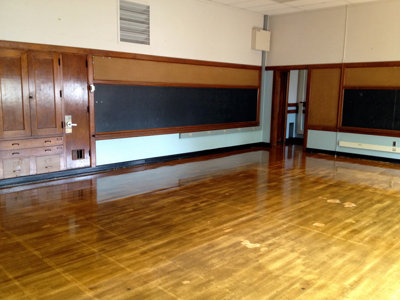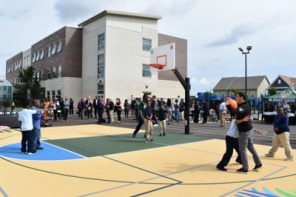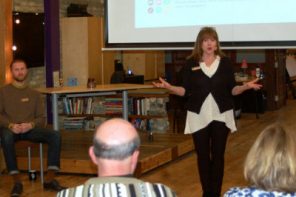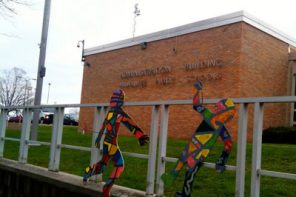Lately I’ve written very little about Montessori in Milwaukee Public Schools. It’s not for the lack of activity and it’s not for the lack of passion. In fact, the opposite. I’ve been too passionate and too active – serving on a committee working on a plan to expand public Montessori in Milwaukee – to write about it.
With that disclaimer, I want to celebrate a step forward for Montessori in MPS. Though there is more than one – like the move and expansion of MacDowell, MPS’ oldest Montessori (not counting Highland Community School, an MPS charter), at the Juneau Campus, the expansion of Montessori at Lloyd Barbee are others – I’m talking about the rapid-fire creation of Howard Avenue Montessori in the old Tippecanoe School, 357 E. Howard Ave.
Milwaukee’s Montessori schools – Lloyd Barbee, Craig, Fernwood, Kosciuszko, MacDowell and Maryland Avenue – which enroll 3% of the district’s roughly 80,000 students, tend to score above district averages in most subjects and have better retention and lower mobility rates than other MPS schools. A number of them even outscore state averages.
Last year, the Milwaukee NAACP said in a report that “prospects for educational achievement are brightest for Milwaukee Public Schools students who are enrolled in Montessori schools.”
However, the same report lamented that “given the small number of students enrolled in the Montessori schools, it cannot be anticipated that the short-term performance of MPS will be robust enough to produce the large numbers required.”
Hence, the push to expand the Montessori options in MPS and spread them further afield, especially to the far north and northwest and southwest sides, where there are currently no public Montessori schools, and to expand existing programs, where there is demand for seats.
“The drive to expand Montessori offerings in MPS had been underway for several months when the Howard Avenue facility unexpectedly became vacant,” says Meagan Holman, Board of School Directors representative for District 8.
“Given the unusually large waitlist at Fernwood just a few miles to the north, we had been looking for a location to site another Montessori program within the area.”
The fact that the idea for creating a Montessori program in the newly vacant building became a reality in little more than a month or so, is almost unheard of in a district the size of MPS.
It happened thanks not only to Holman and her fellow board members, but also to Superintendent Dr. Gregory Thornton, who saw the urgency of working to satisfy demand for Montessori, especially when so many families who don’t get into the Montessori schools leave MPS and take their state funding with them.
But the rapidity still came as a surprise … a very pleasant surprise.
“I was overjoyed that Superintendent Thornton was ready to leap outside the box and even consider a new site so quickly,” says Holman. “It showed that he believed in the Montessori Method and recognized what families in my district are looking for. We took the time to do some due diligence and see if it was truly feasible.
“Given (Howard Avenue) Principal (Phil) Dosmann’s impeccable sense of teacher availability, materials needs,and what it takes to start a Montessori program, together we were able to size up the opportunity and then work with Dr. Thornton to bring it to the Board.”
When it opens on the first day of school, Sept. 4, Howard Avenue will have 120 pupils in three classrooms, that will each hold two half-day sessions. The building has a capacity of 160 so how large the program can grow, and whether or not it will remain in the Howard Avenue building remain to be seen.
Perhaps unsurprisingly, Howard Avenue already has a waiting list, too. So, the demand for Montessori is still strong.
“Most of the current MPS Montessori programs are over-enrolled, keeping waitlists well after the January three-choice enrollment timeframe,” says Holman. “Data indicates that many of those students who are placed on waitlists end up leaving the district when they are unable to secure seats in the educational program desired. The demand is clear!”
The imperative now is for MPS to continue to grow Montessori over the short- and long-term, to accommodate more kids who will benefit from being part of a Montessori school community, but to do it wisely.
Adherence to the strictures of the Montessori method are what has made schools like Fernwood, Craig and Maryland Avenue successful. That must be maintained through teacher training and fidelity to the Montessori method. How to proceed – and to proceed with speed and with care – is what a group of more than a half-dozen folks are working at diligently this year.
“It will take commitment from a variety of stakeholders,” says Holman, “but the result will be more capacity in these high-performing schools, and the impact will be felt throughout Milwaukee.”


 i evaluate to yes even if there's no image
i evaluate to yes even if there's no image  i evaluate to yes even if there's no image
i evaluate to yes even if there's no image  i evaluate to yes even if there's no image
i evaluate to yes even if there's no image  i evaluate to yes even if there's no image
i evaluate to yes even if there's no image  i evaluate to yes even if there's no image
i evaluate to yes even if there's no image  i evaluate to yes even if there's no image
i evaluate to yes even if there's no image